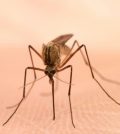- Could Your Grocery Store Meat Be Causing Recurring UTIs?
- Are You Making This Expensive Thermostat Error This Winter?
- Recognizing the Signs of Hypothyroidism
- 10 Strategies to Overcome Insomnia
- Could Artificial Sweeteners Be Aging the Brain Faster?
- Techniques for Soothing Your Nervous System
- Does the Water in Your House Smell Funny? Here’s Why
- Can a Daily Dose of Apple Cider Vinegar Actually Aid Weight Loss?
- 6 Health Beverages That Can Actually Spike Your Blood Sugar
- Treatment Options for Social Anxiety Disorder
-
‘Morning After’ Antibiotics Could Slash Odds for Common STDs
A “morning after” dose of a common antibiotic can greatly lower the chances of sexually transmitted bacterial infections in high-risk people, a new clinical trial has found. Researchers discovered that taking the antibiotic doxycycline within 72 hours...
- Posted April 6, 2023
-
Race Could Matter When It Comes to Parkinson’s Severity
It’s safe to say that the debilitating loss of motor control that typifies Parkinson’s disease is bound to undermine any patient’s quality of life. But new research now suggests that race complicates the equation, with quality of...
- Posted April 6, 2023
-
Genes or Lifestyle? How a Person Becomes Obese Could Influence Heart Health
It’s well known that being overweight or obese can increase health risks. But a new study finds that the reasons why a person is obese may have some impact on heart disease risk. Specifically, being obese because...
- Posted April 6, 2023
-
Health Highlights: April 6, 2023
‘Morning after’ antibiotics might prevent common STDs. Taking a common antibiotic within 72 hours of unprotected sex cut the chances of a sexually transmitted bacterial infection in high-risk groups, researchers found. Read more Immune system may hold...
- Posted April 6, 2023
-
Mosquito Spit: It Could Weaken People’s Defense Against Dengue
A new discovery explains why deadly mosquito-borne dengue viruses are so easily transmitted: The answer may lie in the insect’s saliva. The saliva of mosquitoes infected with dengue viruses contains a substance that thwarts the human immune...
- Posted April 6, 2023
-
Your Sleep Can Affect Your Stroke Risk
Sleep problems — from snoring to sleeping too much or too little — may be associated with elevated stroke risk, researchers say. Snorting during sleep, having poor quality of sleep and sleep apnea may also be linked...
- Posted April 6, 2023
-
On Medicaid & Need Mental Health Services? Where You Live in U.S. Matters
Medicaid reimbursement for mental health services varies widely across the United States, making it hard for many folks who need help to get it, a new study finds. Researchers found as much as a fivefold difference among...
- Posted April 5, 2023
-
AI Beats Trained Staff in Spotting Heart Trouble on Sonograms
It’s machine: 1, man: 0 in the latest battle between artificial intelligence (AI) technology and human health care pros. This time researchers set out to see if cardiologists could tell the difference between AI and a sonographer’s...
- Posted April 5, 2023
-
Johnson & Johnson Agrees to $8.9 Billion Settlement in Talcum Powder Lawsuit
Tens of thousands of people suing Johnson & Johnson may get some relief after the company announced Tuesday that it will pay $8.9 billion to settle lawsuits that have been going for more than a decade. The...
- Posted April 5, 2023
-
AHA News: Discrimination Linked to Higher Risk of Death, Particularly From Cardiovascular Disease
WEDNESDAY, April 5, 2023 (American Heart Association News) — Experiencing discrimination may increase the chance of dying, especially from cardiovascular-related causes, according to a new study that followed participants for nearly two decades. Previous studies have found...
- Posted April 5, 2023




















